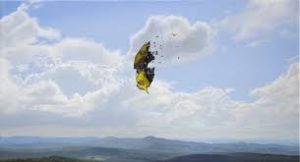The reasoning mind is involved with the trial-and-error method. It sets up hypothesis, and its very existence is dependent upon a lack of available knowledge — knowledge that it seeks to discover.
In the dreaming state the characteristics of the reasoning mind become altered, and from a waking viewpoint it might seem distorted in its activity. What actually happens, however, is that in the dreaming state we are presented with certain kinds of immediate knowledge. It often appears out of context in usual terms. It is not organized according to the frameworks understood by the reasoning portions of our mind, and so to some extent in dreams we encounter large amounts of information that we cannot categorize.
The information may not fit into our recognizable time or space slots. There are, in fact, many important issues connected with the dreaming state that can involve genetic activation of certain kinds: information processing on the part of the species, the insertion or reinsertion of civilizing elements — and all of these are also connected with the reincarnational aspects of dreaming.
I have not touched upon some of these subjects before, since I wanted to present them in that larger context of man’s and woman’s origins and historic appearance as a species. I also wanted to make certain points, stressing the importance of dreams as they impinge upon and help form cultural environments. Dreams also sometimes help in showing the pathways that can be taken to advantage by an individual, by a group of individuals, and therefore help clarify the ways in which free will might most advantageously be directed. So I hope to cover all of these subjects.
Let us first of all return momentarily to the subject of the reasoning mind, its uses and characteristics. It seems to the reasoning mind that it must look outside of itself for information, for it operates in concert with the physical senses, which present it with only a limited amount of information about the environment at any given time. The physical eyes cannot see today the dawn that will come in the morning. The legs today cannot walk down tomorrow’s street, so if the mind wants to know what is going to happen tomorrow, or what is happening now, outside of the physical senses’ domain, then it must try through reason to deduce the information that it wants from the available information that it has. It must rely upon observation to make its deductions accordingly. In a fashion, it must divide to conquer. It must try to deduce the nature of the whole it cannot perceive from the portions that are physically available.
Children begin to count by counting on their fingers. Later, fingers are dispensed with but the idea of counting remains. There have been people throughout history who mentally performed mathematical feats that appear most astounding, and almost in a matter of moments. Some, had they lived in our century, would have been able to outperform computers (just as some are outperforming computers these days!). In most cases where such accomplishments show themselves, they do so in a child far too young to have learned scientific mathematical procedures to begin with, and often such feats are displayed by people who are otherwise classified as idiots (idiot savants), and who are incapable of intellectual reasoning.
Indeed, when a child is involved, the keener his or her use of the reasoning mind becomes the dimmer his or her mathematical abilities grow. Others, children [or adults] who would be classified as mentally deficient, can tell, or have been able to tell, the day of the week that any given date, past or present, would fall upon. Others have been able, while performing various tasks, to keep a precise count of the moments from any given point in time. There have been children, again, with highly accomplished musical abilities, and great facility with music’s technical aspects — all such accomplishments before the assistance of any kind of advanced education.
Now, some of these children went on to become great musicians, while others lost their abilities along the way, so what are we dealing with in such cases? We are dealing with direct knowing. We are dealing with the natural perceptions of the psyche, at least when we are speaking in human terms. We are dealing with natural, direct cognition as it exists before and after man’s and woman’s experience with the reasoning mind.
Some of those abilities show themselves in those classified as mentally deficient simply because all of the powers of the reasoning mind are not activated. In children under such conditions, the reasoning mind has not yet developed in all of its aspects sufficiently, so that in a certain area direct cognition shines through with its brilliant capacity.
Direct cognition is an inner sense. In physical terms we might call it remote sensing. Our physical body, and our physical existence, are based upon certain kinds of direct cognition, and it is responsible for the very functioning of the reasoning mind itself. Scientists like to say that animals operate through simple instinctive behavior, without will or volition: It is no accomplishment for a spider to make its web, a beaver its dam, a bird its nest, because according to such reasoning, such creatures cannot perform otherwise. The spider must spin his web. If he or she chooses not to, he or she will not survive. But by that same reasoning — to which, of course, I do not subscribe — we should also add that man and woman can take no credit either for his or her intellect, since man and woman must think, and cannot help doing so.
Some pessimistic scientist would say: “Of course,” for man and woman and animal alike are driven by their instincts, and man’s and woman’s claim to free will is no more than an illusion.
Man’s and woman’s reasoning mind, however, with its fascinating capacity for logic and education, and for observation, rests upon a direct cognition — a direct cognition that powers his or her thoughts, that makes thinking itself possible. He or she thinks because he or she knows how to think by thinking, even though the true processes of thought are enigmas to the reasoning mind.
In dreams the reasoning mind loosens its hold upon perception. From our standpoint we are almost faced with too much data. The reasoning mind attempts to catch what it can as it reassembles its abilities toward waking, but the net of its reasoning simply cannot hold that assemblage of information. Instead it is processed at other levels of the psyche. Dreams also involve a kind of psychological perspective with which we have no physical equivalent — and therefore such issues are most difficult to discuss.
The reasoning mind is highly necessary, effective, and suitable for physical existence, and for the utilization of free will, which is very dependent upon perception of clearly distinguishable actions. In the larger framework of existence, however, it is simply one of innumerable methods of organizing data. A psychological filing system, if you prefer.
Our dreaming self possesses psychological dimensions that escape us, and they serve to connect genetic and reincarnational systems. We must, again, realize that the self that we know is only a part of our larger identity — an identity that is also historically actualized in other times than our own. We must also understand that mental activity is of the utmost potency. We experience our dreams from our own perspective, as a rule. I am simply trying to give a picture of one kind of dream occurrence, or show one picture of dream activity of which we are not usually aware.
If we are having a dream as oneself from our own perspective, another reincarnational self may be having the same dream from its perspective — in which, of course, we play a minor role. In our dream, that reincarnational self may appear as a minor character, quite on the periphery of our attention, and if the dream were to include an idea, say, for a play or an invention, then that play or invention might appear as a physical event in both historic times, to whatever degree it would be possible for the two individuals living in time to interpret that information. But culture throughout the ages was spread by more than physical means. Abilities and inventions were not dependent upon human migrations, but those migrations themselves were the result of information given in dreams, telling tribes of men and women the directions in which better homelands could be found.
Direct cognition: You know what you know.
Our knowledge knows how to flow through the techniques we have learned, to use them and become part of them, so that a painting emerges with a spontaneous wisdom. That is what we are learning. That is what the painting shows. That is where we are.
To some extent each vision, each subject matter, will itself make minute alterations in technique of we allow it to. Our impulses have shadings as our colors do. They should mix and merge with our brushstrokes, so that the idea of our subject matter is almost magically contained in each spot of paint, and that is what we are learning. Or rather, we are learning to take advantage of our direct cognition.










